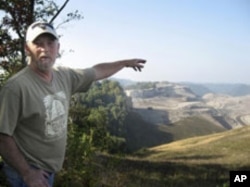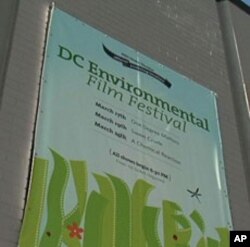Every spring the nation's capital welcomes the cherry blossoms and the Environmental Film Festival. Flo Stone, director and founder of the festival, says the event is wildly popular.
"It's a collaborative festival with, this year, 110 participating organizations. And we're showing films in 56 different locations. We've never had a place turn us down. Never."
Fresh perspective
Movie theaters, museums and universities screen films with a fresh perspective on environmental issues.For example, Eskil Hardt's "One Degree Matters," focuses on the destructive impact of global warming.
Hardt says that, while his film rings the alarm on global warming, it also carries a positive message that we can stop carbon emissions with renewable energy such as solar and wind power.
"We are showing that the technology is out there," says Hardt. "We can start changing the world tomorrow if we want to."
Green house
The U.S. documentary, "The Green House," shows how private initiative is changing the world one step at a time.
Jason Scadron and Liv Violette's documentary chronicles the building of the first carbon-neutral house in McLean, Virginia, a Washington, D.C. suburb. Architect Mark Turner built the house, which is about 75 percent more energy efficient than the average American home.
Its green roof, thermal floor tracks and fiber optic skylights all say green, Scadron says. "We really focused on how this house is being made. And how this house can be an example of future houses. There is a wellness to living green."
Coal country debate
That's not the case with West Virginia's coal country.The documentary, "Coal Country," shows how a mining technique called mountain top removal destroys the environment and releases green house gases in the Appalachian mountains.
"Where they blast off the tops of mountains, they role off the debris and the rock and the trees, roll them down the mountain sides into the valleys which contain streams," says filmmaker Phyllis Geller.
"Coal Country" also sheds light on the tensions between those in Appalachia who work for the industry and people who live close to the mining sites and feel their lives are threatened by carbon emissions.
"The coal industry has supported myself, my wife and my three children," declares a coal miner.
"They have peppered us with coal dust," says a lady, who lives in the area.
The documentary says coal produces nearly half the electricity in the United States. Although it's not easy to replace, many of the films say environmental progress is on the horizon.
Change is within our means and without it, the filmmakers say, we would be doomed.






